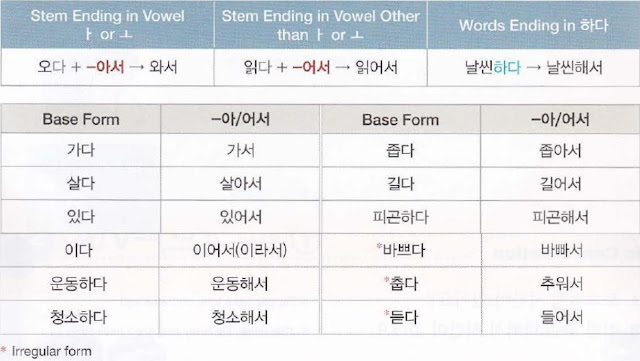기분이 좋아서 줌을 췄어요.
I was in such a good mood that I danced.
늦어서 죄송합니다.
I’m sorry for arriving late.
Grammar Focus:
-아/어서 is used to express that the information in the first clause is the reason for or the cause of the succeeding clause. It corresponds to ‘because (of)’, ‘on account of, and ‘so… that…’ in English. If the stem ends in the vowel ㅏ or ㅗ, then -아서 is used. Otherwise, -어서 is used. As for verbs ending in 하다, the form changes to 해서, and in the case of 이다, 이어서 is used, except in conversation, when 이라서 is used.
 Notes:
Notes:
-아/어서 cannot be used in imperative or propositive sentences.
• 이 신발은 커서 다른 신발을 보여 주세요. (X)
->이 신발은 크니까 다른 신발을 보여 주세요. (〇)
These shoes are big, so please show me a different pair.
• 오늘 약속이 있어서 내일 만날까요? (X)
-> 오늘 약속이 있으니까 내일 만날까요? (〇)
I have to meet someone else today, so shall we meet tomorrow?
• 이게 좋아서 이걸로 삽시다. (X)
->이게 좋으니까 이걸로삽시다. (〇)
I like this one, so let’s buy it.
(See also “A/V-(으)니까 ① Reasons and Causes”: click here)
Tense markers such as -았/었- and -겠- cannot come before -아/어서.
• 밥을 많이 먹었어서 배가아파요. (X)
->밥을 많이 먹어서 배가 아파요. (〇)
My stomach hurts on account of eating so much food.
• 이 옷이 예쁘겠어서 입고 싶어요. (X)
->이 옷이 예뻐서 입고 싶어요. (〇)
I want to wear these clothes because they’re pretty.
(Compare with “V-아/어서: Time Expressions”: click here)
Conversation:
A: 토요일에 시간이 있어요? Do you have time on Saturday?
B: 이번 주는 바빠서 시간이 없어요. This week, I’m busy and don’t have time.
A: 이 옷을 왜 안 입어요? Why don’t you wear these clothes?
B: 그 옷은 작아서 못 입어요.
Those clothes are so small that I can’t wear them.
A 집에 갈 때 버스를 타요? Do you take the bus when you go home?
B 아니요, 퇴근 시간에는 차가 많아서 지하철을 타요.
No, because there’s a lot of traffic when I get off work, I take the subway.
>> Full of ‘Korean grammar in use – Beginner’: Click here
>> Fanpage: Say Hi Korean
